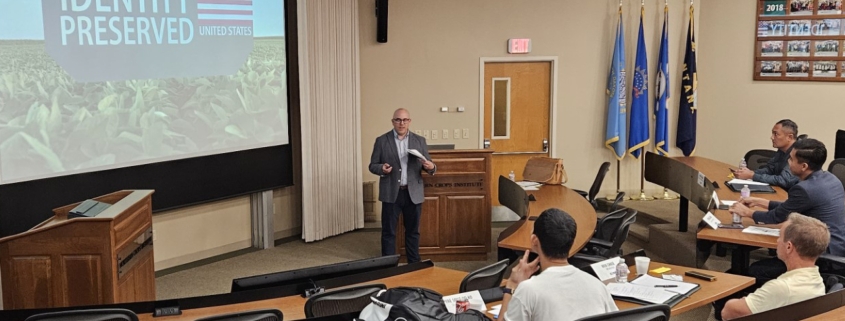SSGA highlights economic benefits of U.S. Identity Preserved to trade group
The Northern Crops Institute (NCI) welcomed a small trade group from Cambodia and Myanmar to Fargo, N.D., this week as part of a Food Grade Soybean Procurement Course. The course focused on the various aspects of sourcing and purchasing high-quality identity preserved (IP) soybeans for food products such as tofu, soymilk and tempeh.
“Through this course, our group had the opportunity to learn more about IP soybeans, meet with U.S. exporters and learn more about the quality of the U.S. identity preserved system from the seed to when it arrives at their facility,” said Alan Poock, Asia Division Director for the World Initiative for Soy in Human Health (WISHH).
As incomes rise in many Asian countries, so does the emphasis on food safety and food quality. Identity preserved provides a way to know the history of the ingredients, including when it’s planted and harvested and where it was stored. This allows the soy consumer to be confident that their soy ingredients are consistently of high quality and handled in a safe way.
For those IP soy purchasers, typically from Asian countries, that confidence in a high-quality product is important, especially since they are paying more for IP than traditional soybeans. However, Shane Frederick, manager of strategic Programs with Specialty Soya and Grains Alliance (SSGA), spoke to the WISHH group of how SSGA’s U.S. Identity Preserved mark and assurance plan, which was established in 2021, saves significant costs during processing and can increase profits at market.
“One of our big challenges is to convince the foreign buyer that they have to pay more for this variety-specific identity preserved product,” Frederick said, “but, really, when you break things down there is an economic advantage to paying more.”
Along with high quality and variety specificity, the product is already cleaned and sorted, which means that the purchaser will save money during processing on cleaning and sorting costs, as well as equipment maintenance and labor over time. Frederick also reported that higher protein IP varieties can get more bang for their buck and charge more for an overall better product.
NCI’s Food Grade Soybean Procurement Course, which was sponsored by the Minnesota Soybean Research & Promotion Council, also gave the participants an inside look into the process of purchasing IP soybeans.
“It’s a great opportunity for us to provide a better understanding of food-grade soybean production in this region of the world and help them understand how to purchase it, who to purchase it from and overall how the system works,” said Northern Crops Institute Program Manager Brian Sorenson. “When they go back to their home country, we want them to have a really good understanding of what it takes to buy IP, as well as take away some of the unknowns and concerns that they may have had about the process.”
In addition to learning about economic advantages to IP, the WISHH trade group learned in-depth about the markets, soy food plant operations and soybean harvest and storage. The delegation also toured various soybean processing facilities and area farms where IP soybeans are grown.
The trade mission wraps up with a trip to Illinois for SSGA’s Fork to Farm event on June 26. Fork to Farm connects the end users of the IP soybeans with farmers who grow the product, and allows potential IP growers to network with current growers and learn more about what it takes to grow IP.







Leave a Reply
Want to join the discussion?Feel free to contribute!